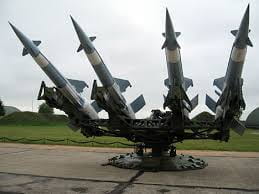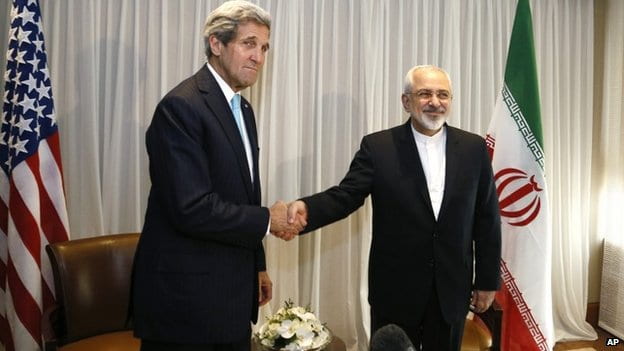This column is authored by CCLP senior fellow Vasily Gatov, founder of the Novosti Media Lab
BOSTON–As the framework for a nuclear deal with Iran was concluded in Geneva, the world’s press engaged in a commentary race on the meaning and implications of the agreement. One may expect a significant difference in public attitude in the U.S., EU and the Middle East; as various countries have different approaches and positions on the issues of security, consequences of the accord, and even the vision of the strategic implications. But when it comes to Russian media coverage of the Geneva process itself and the commentary afterward, the world is portrayed as a completely different place.
Russia was a part of the negotiating group, and it has legitimate interests in regard to Iran. Rosatom, the country’s nuclear monopoly, has been constructing Bushir NPP and has a long-term commitment in the development of Iran’s energy system. Rostech, the Russian weapons producer and trader, sees Iran as a potential lucrative market and has an unfinished contract on the S-300 air defense system’s delivery to the Islamic republic. Russia shares the Caspian Sea with Iran, and Russia – at least the European and South Siberia parts – lies within range of Iran’s rockets, which are the cause of NATO’s controversial missile defense system. With all the friendliness that Putin’s Moscow demonstrates to Iran today, the diplomats and analysts never forget that Russia is ordinarily pictured in official Tehran media as a “Satan-infected country” and has never been regarded as a friend or ally. There should be no doubt that Vladimir Putin understands the danger of the potential Iran’s nuclear capability.
Yet, Russian media reaction on the Geneva deal is strange. No, this is too plain to say it is strange – it’s rather misshaped, twisted, camouflaged and bizarre from every angle. Assuming the high level of government control over the media (especially the media that covers international relations), the response reflects, at least to a certain extent, the similar rotten attitude to this deal in the political leadership of Russia. Assuming the complexity of the issue and the controversial nature of the Iranian state, one should expect at least some doubts or deliberation; neither is present. Also, as Russian state conducts different or separate communication modes for internal and external communications (I try to refrain from using the word “propaganda” in this particular case), an expectation assumes that the deal should be reflected differently, at least in nuances, for domestic and for international streams. But this is not the case.
First, Russian state agencies (TASS, RIA and RT) were all skeptical on a possible Geneva accord until the very last minute. When U.S. Secretary of State John Kerry and Minister Zahid were on their way to the briefing room to announce the breakthrough, TASS reported that “the deal is not coming together and this is a deliberate demonstration of the impotence of the American diplomacy.” The wire was corrected a few minutes later but “the source close to the negotiations” told TASS that the Americans are irresponsibly tough while Iran makes a legitimate point.
Delivering the main story, Russian state media had downplayed the importance of the international accord that allowed the breakthrough (particularly the efforts of the U.S. State Department), while praising Putin’s personal input in “formulating a principle of an unconditional acceptance of Iran’s right to conduct a peaceful nuclear research program.”
Within minutes after the announcement, TASS and RIA broadcast the commentary of an important Russian senator and head of the international affairs committee of the Upper House of parliament, Konstantin Kosachev, who declared that “Russia was the only bearer of common sense at the table,” and this was the main reason an agreement was reached.
Liberal and opposition-minded press have been much less triumphant on the outcome, pointing out the possible decline of oil prices that may happen when Iran comes back to its regular supply capacity. Some reports were skeptical of such, joining the chorus of conservative and alarmist U.S. critics of the deal, underlining the capacity of Iran to fool the partners. Traditionally pro-Israel, Russian liberal media also were among the first to transmit Tel Aviv’s concerns and anger.
The next day brought very bad news (predicted by some liberal analysts) for Russia. Reacting positively on the Iran deal, world commodity markets dropped the price of a barrel of oil, which Russia depends quite heavily upon) by 5 percent. Russian state media immediately downplayed the importance of the accord. It took a few days for the Ministry of Foreign Affairs to develop “recommendations” on how to interpret the issue. Presenting this twisted point of view, the columnist of the government daily “Rossiiskaya gazeta” Leonid Radzikhovsky wrote, “What a strange thing is ‘global politics.’ USA has insisted on sanctions that damaged the country’s interest. Russia was fighting to lift the sanctions against Iran, which were greatly favorable to our national interest.” Some very pro-Putin (and anti-American) commentators even dared to claim the U.S.-Saudi conspiracy that doubled-down on oil to further damage Russian economy – but this notion never got traction to make it too public.
The Wall Street Journal story on the U.S. “bunker-blaster” test was a precious gift to Russian state media. On a single day (April 5th) it made the front pages of newspapers, top slots in state TV news broadcasts, 34 slug lines in the wires, and talk radio devoted several hours of evening shows to this scoop. Why? The answer is simple – the “reminder” to Iran from U.S. Air Force has been applied to Putin’s constructed nightmares; but even more important – the case served as perfect propaganda material that can prove (with some spicing and manipulative assertions) the supposed treacherous character of American politics.
Of course, official and pro-government Russian press needed some interpretation of the post-April 2nd discussion. Benjamin Netanyahu’s statement was widely publicized and commented on – the major tone, meanwhile, was not supportive of the concern or as one may expect, some critique on Israel’s fixation on Iran’s nuclear capabilities. Once again, the twisted minds of official Russian commentators interpret Bibi’s hysterical claim as USA’s deception of the allies that should remind Ukraine and those puny understates in the Baltics what the price and value of an alliance with America is. Alexey Pushkov, the Duma’s International Committee chair, had also speculated that Israel and Saudi Arabia will now blackmail Washington and undermine the accord as it goes against their interests in the region.
The Russian reader may later find in the domestic press an apparent diversity of opinions regarding the Iran deal. As the U.S. political class was chewing over the terms and conditions, and with threats from Congress to block lifting the sanctions, Russian press immediately delivered the most obscure reactions from Washington. Every statement from John Boehner or Rand Paul or Marco Rubio on their disapproval was interpreted as President Obama’s crapping pants. Despite the previously stated “importance” of the accord and praise of Russia’s role in the international efforts, the official commentators took the tone of schadenfreude. Leonid Radzikhovsky (mentioned above) speculated in his commentary in Rossiiskaya Gazeta that the whole Iranian nuclear problem is a piece of PR, a camouflage only aimed to raise the importance of Iran in the global ranks.

Weeks later, oil prices came back to more comfortable levels, and Russian president Vladimir Putin undermined the first lifting of sanctions – symbolically approving the long disputed sale of S-300 air defense systems to Iran. As important as it could be in terms of Iran’s security against possible strikes from Israel or presumably, the arch-rival Saudi Arabia or the U.S., this supply is largely symbolic. It will take months to complete the delivery and deploy the missile complexes. But Russian pro-government media reacted to this gesture with joy and celebration, as if Russia had just won a major war, the World Cup, or yet another Olympics. Critical notes from the U.S. and the EU, warning Putin of an inappropriate rush, only assured Russian commentators of the particular importance of this Easter Day news. A maverick Israeli journalist, who hides in Russia because of his austere pro-Arab views and criticism of his country’s system of power, Israel Shamir, writes in Izvestia, “The Department of State, Israel and Saudi foreign affairs are horrified with this Easter egg delivered by a double-headed eagle.” Russian cote’d’arms include an imperial double-headed eagle, the mascot of Romanov’s dynasty. Shamir and many other Russian journalists, politicians and experts hurried to deliver a hymn of admiration to the fearless president of Russia, who’s challenging the world hegemony with this teasing (regardless of the consequences that are yet to be weighted).
Another striking example of the twisted logic that shows up in Russian coverage of the Iran deal comes from RIA Novosti (now an empty shell of a once great news team). On Tuesday, April 14, the agency continues writing on the topic of the deal and the S-300 sale to Iran, even though there is nothing more to say. In previous days, the agency wired all statements, technical specs of the missile system, and comments from military trade experts that claim “S-300 make Iran inoculated against an devilish Israel with its outdated F-18 Hornets.” So, the editor decides to cover – no joke – the comments on Western media websites that positively appraise Russia’s decision to supply Iran with S-300 missiles. Assuming numerous accusations from Russian trolls ravaging the discussion boards and comment sections on global media websites, this idea is chilling and serves the general purpose of propaganda well. “Putin had once shamed Obama with a speed of his action,” RIA cited some nicknamed commentator. “It’s Russia, not the U.S., who struck the deal. Obama once again has a #2 tee-shirt,” a CNBC user with a “desertlover” call-sign wrote, supporting the official Russian line.
I would probably save you from further quotations as they are odd and repetitive. The biggest discovery one can make with the amazing internet time machine while looking at the Russian reaction on the Iran nuclear deal is different from any version of journalism. Russian communication feels fully orchestrated and manipulated even as some actors in the chorus may look independent and critical to the official tone. News items and commentary share the same wording (dictated from the Ministry of Foreign Affairs), and the news agenda is managed and set by Kremlin operatives (they have to serve Putin first, flattering his success).
Russia is speeding up to the reincarnation of the Brezhnev-styled Soviet Union, not only in international politics and domestic governance, but in communications, too. The older generation of Russia watchers should remember Andrey Gromyko, Soviet foreign minister, nicknamed “Mister Nyet.” Some could even recollect the strangest mixed messages that the USSR had been sending in the last decades of its existence: “The West (U.S. and NATO) scare the world with its military might – therefore the Soviet Union has the right to stockpile its weaponry as well; but on the other hand, the capitalist society is in decay and is condemned to fall.” The internal controversy of this message had been a puzzle that played out very poorly for the late Soviet Union: one day the nation discovered itself bust economically and socially, as well as abandoned by all those allies, supplied with cash, missiles and robust wording from Kremlin.
Vasily Gatov, CCLP’s newest senior fellow, is a Russian media researcher and author based in Boston. He has over 28 years of professional experience in domestic and international media.
